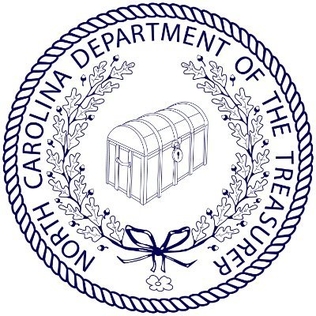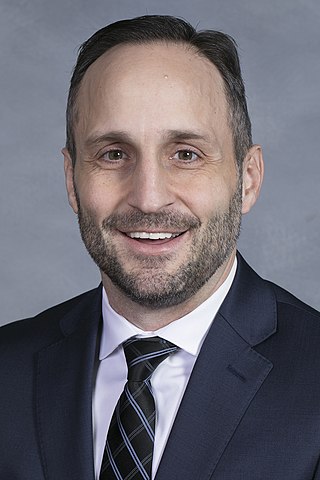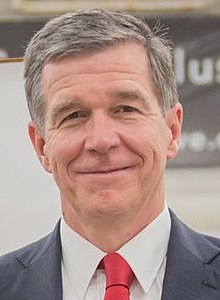
The governor of Indiana is the head of government of the U.S. state of Indiana. The governor is elected to a four-year term and is responsible for overseeing the day-to-day management of the functions of many agencies of the Indiana state government. The governor also shares power with other statewide executive officers, who manage other state government agencies. The governor works out of the Indiana Statehouse and holds official functions at the Indiana Governor's Residence in the state capital of Indianapolis.

The governor of South Carolina is the head of government of South Carolina. The governor is the ex officio commander-in-chief of the National Guard when not called into federal service. The governor's responsibilities include making yearly "State of the State" addresses to the South Carolina General Assembly, submitting an executive budget, and ensuring that state laws are enforced.

The North Carolina General Assembly is the bicameral legislature of the state government of North Carolina. The legislature consists of two chambers: the Senate and the House of Representatives. The General Assembly meets in the North Carolina Legislative Building in Raleigh, North Carolina.

The North Carolina Council of State is the collective body of ten elective executive offices in the state government of North Carolina, all of which are established by the state constitution. The Council of State includes the Governor, Lieutenant Governor, Secretary of State, State Auditor, Treasurer, Superintendent of Public Instruction, Attorney General, Commissioner of Agriculture, Commissioner of Labor, and Commissioner of Insurance. Together with the North Carolina Cabinet and several independent agencies, the Council of State offices constitute the executive branch of North Carolina's state government.

The lieutenant governor of North Carolina is the second-highest elected official in the U.S. state of North Carolina and is the only elected official to have powers in both the legislative and executive branches of state government. A member of the North Carolina Council of State, the lieutenant governor serves a four-year term with a two consecutive term limit. The current lieutenant governor is Mark Robinson, a Republican, who has held the office since 2021. The Constitution of North Carolina designates the lieutenant governor the ex officio president of the State Senate and a member of the State Board of Education. They are also required to serve as acting governor of the state in the event of the governor's absence, and assume the governorship in the event it becomes vacant.

The State Auditor of North Carolina is a statewide elected office in the U.S. state of North Carolina. The state auditor is a constitutional officer responsible for overseeing and reviewing the financial accounts of all state government agencies. The auditor also conducts performance audits of state agencies, ensures state agencies' accounting conforms with Generally Accepted Accounting Principles, evaluates the integrity of computer-generated information, and investigates the misuse of state funds or property. The incumbent is Jessica Holmes, who became state auditor on Dec. 16, 2023.

The North Carolina Secretary of State is an elected constitutional officer in the executive branch of the government of the U.S. state of North Carolina, and is fourth in the line of succession to the office of Governor of North Carolina. The secretary maintains the official journal of the North Carolina General Assembly and is responsible for overseeing land records, chartering corporations, and administering some commercial regulations. The incumbent is Elaine Marshall, a Democrat and the first woman elected to the office.

The North Carolina State Treasurer is a statewide elected office in the U.S. state of North Carolina responsible for overseeing the financial operations of state government. The current state treasurer is Dale Folwell.

The North Carolina superintendent of public instruction is an elected constitutional officer in the executive branch of the government of the U.S. state of North Carolina. As the head of the North Carolina Department of Public Instruction, the superintendent oversees the public school systems of the state. They also serve as the secretary of the North Carolina State Board of Education and are a member of the North Carolina Council of State. The incumbent is Catherine Truitt, who became superintendent on January 2, 2021.

The Supreme Court of the State of North Carolina is the state of North Carolina's highest appellate court. Until the creation of the North Carolina Court of Appeals in the 1960s, it was the state's only appellate court. The Supreme Court consists of six associate justices and one chief justice, although the number of justices has varied. The primary function of the Supreme Court is to decide questions of law that have arisen in the lower courts and before state administrative agencies.

The attorney general of North Carolina is a statewide elected office in the U.S. state of North Carolina. The attorney general is a constitutional officer responsible for representing state agencies in legal matters, supplying other state officials and prosecutors with legal advice, and leading the North Carolina Department of Justice. The incumbent attorney general, Josh Stein, assumed office on January 1, 2017. The position of attorney general dates back to North Carolina's colonial history. North Carolina's 1776 constitution established the office as an official appointed by the North Carolina General Assembly. The state's 1868 constitution made the attorney general an elected executive official with their duties prescribed by law. Since 1971, the officer has sat on the North Carolina Council of State.
The Constitution of the State of North Carolina governs the structure and function of the state government of North Carolina, one of the United States; it is the highest legal document for the state and subjugates North Carolina law.

The Commissioner of Agriculture is a statewide elected office in the U.S. state of North Carolina. The commissioner is a constitutional officer who serves as the head of the state's Department of Agriculture and Consumer Services, which is responsible for promoting agriculture in the state. They are also a member of the Council of State. The incumbent is Steve Troxler, who has served since 2005.
The North Carolina Cabinet is the group of unelected heads of the executive departments of the Government of North Carolina. It is separate and distinct from the North Carolina Council of State, the members of which are elected statewide, and which makes up the rest of the executive leadership of the government. All cabinet secretaries are appointed by the governor.

The president pro tempore of the North Carolina Senate is the highest-ranking officer of one house of the North Carolina General Assembly. The president of the Senate is the Lieutenant Governor of North Carolina, but the president pro tempore actually holds most of the power and presides in the absence of the Lt. Governor. The president pro tempore, a senior member of the party with a majority of seats, appoints senators to committees and also appoints certain members of state boards and commissions. From 1777 to 1868, North Carolina had no Lieutenant Governor, and the highest-ranking officer of the Senate was known as the "Speaker". The Speaker of the Senate was next in line if the office of Governor became vacant. This occurred on two occasions.

The commissioner of insurance is a statewide elected office in the U.S. state of North Carolina. The commissioner is a constitutional officer who leads the state's Department of Insurance. The commissioner also oversees the Office of the State Fire Marshal and sits on the North Carolina Council of State. The current commissioner is Mike Causey, who has held that office since January 1, 2017.

The commissioner of labor is a statewide elected office in the U.S. state of North Carolina. The commissioner is a constitutional officer who leads the state's Department of Labor. North Carolina's general statues provide the commissioner with wide-ranging regulatory and enforcement powers to tend to the welfare of the state's workforce. They also sit on the North Carolina Council of State. The incumbent is Josh Dobson, who has served since January 2021.
The Superior Court is North Carolina's general jurisdiction trial court. It was established in 1777 and is North Carolina's oldest court.

The government of North Carolina is divided into three branches: executive, legislative, and judicial. These consist of the Council of State, the bicameral legislature, and the state court system. The Constitution of North Carolina delineates the structure and function of the state government.
In the U.S. state of North Carolina, District Courts are tribunals inferior to the Superior Court. In criminal matters, they have jurisdiction over misdemeanor and infraction cases. In civil matters, the courts have original jurisdiction over civil disputes with an amount in controversy under $25,000, divorces, child custody disputes, and child support payments.
























